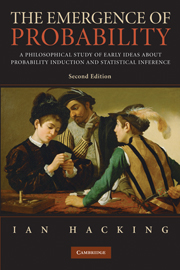 The Emergence of Probability
The Emergence of Probability Book contents
- Frontmatter
- Contents
- Introduction 2006
- 1 An absent family of ideas
- 2 Duality
- 3 Opinion
- 4 Evidence
- 5 Signs
- 6 The first calculations
- 7 The Roannez circle (1654)
- 8 The great decision (1658?)
- 9 The art of thinking (1662)
- 10 Probability and the law (1665)
- 11 Expectation (1657)
- 12 Political arithmetic (1662)
- 13 Annuities (1671)
- 14 Equipossibility (1678)
- 15 Inductive logic
- 16 The art of conjecturing (1692[?] published 1713)
- 17 The first limit theorem
- 18 Design
- 19 Induction (1737)
- Bibliography
- Index
- Frontmatter
- Contents
- Introduction 2006
- 1 An absent family of ideas
- 2 Duality
- 3 Opinion
- 4 Evidence
- 5 Signs
- 6 The first calculations
- 7 The Roannez circle (1654)
- 8 The great decision (1658?)
- 9 The art of thinking (1662)
- 10 Probability and the law (1665)
- 11 Expectation (1657)
- 12 Political arithmetic (1662)
- 13 Annuities (1671)
- 14 Equipossibility (1678)
- 15 Inductive logic
- 16 The art of conjecturing (1692[?] published 1713)
- 17 The first limit theorem
- 18 Design
- 19 Induction (1737)
- Bibliography
- Index
Summary
Many modern philosophers claim that probability is a relation between an hypothesis and the evidence for it. This claim, true or false, conceals an explanation as to the late emergence of probability: the relevant concept of evidence did not exist beforehand. The way in which it came into being has much to do with the specific way that the dual concept of probability emerged. One of the preconditions for probability was the formation of this concept of evidence.
What concept of evidence? Crudely, that which some philosophers have called ‘inductive evidence’. The label is inaccurate, but at the beginning it can remind us of the philosophers' problem of induction, almost always attributed to David Hume's Treatise, published in 1739. Some elements of this problem may have been anticipated in the Outlines of Pyrrhonism [II, 204], written by the Greek sceptic, Sextus Empiricus (c. A.D. 200). But aside from odd and fragmentary passages almost certainly dedicated to other problems we find no hint of a problem of induction until Hobbes, or, better, Joseph Glanvill's Vanity of Dogmatizing of 1661. All modern students of epistemology agree that the problem of induction is of fundamental importance. Most of the other basic problems can be identified throughout the whole Western tradition, and have classic texts in Plato or Aristotle. Why is what C. D. Broad called the scandal of philosophy – the problem of induction – such a newcomer on the scene? There is a simplistic answer. Until the seventeenth century there was no concept of evidence with which to pose the problem of induction!
- Type
- Chapter
- Information
- The Emergence of ProbabilityA Philosophical Study of Early Ideas about Probability, Induction and Statistical Inference, pp. 31 - 38Publisher: Cambridge University PressPrint publication year: 2006
- 3
- Cited by
